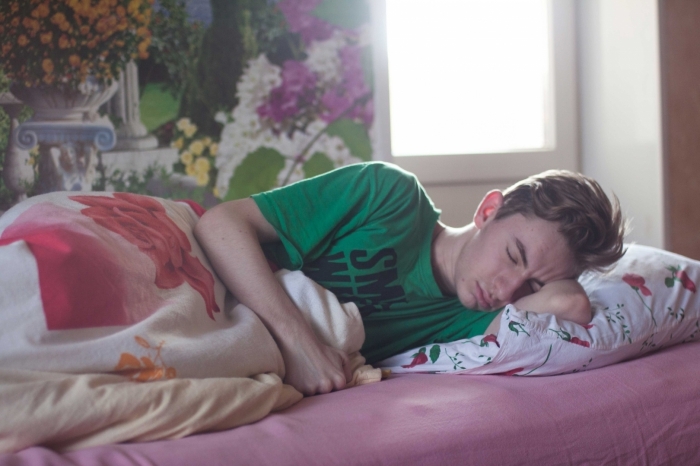
What to do with sleep-deprived sons?
In this week's edition of The Journey: From Boys to Men, we discuss teenage sleep habits - how much sleep our boys need and how we can help them get it.

I asked my son what he wanted to do over the July school holidays. His response was a simple, but anxiety-inducing grumble: “SLEEP.”
My mind raced to him telling me about friends who said they binge-watched Netflix shows and gamed into the early hours of the morning. I tried to think back through the past few weeks - was I always remembering to remove his devices at least an hour before bedtime in accordance with new house rules? Was I making him go to bed early enough?
Most of us parents worry that our children don’t get enough sleep after busy late afternoons and evenings taken up with extra-curricular activities, homework, part-time work and simply catching up with family at dinner, not to mention the lure of social media and digital games.
There has been growing attention to sleep and ‘sleep hygiene’ - or our lack thereof - in the media recently. But what are the specific needs of teenagers to enable them to develop and perform as best as they can?
Scott Nodwell, a psychotherapist and counsellor at Claremont’s Elizabeth Clinic, counts healthy youth development, education and family dynamics among his specialties. He says the leading research has found teenagers need about nine hours of sleep a night, but about a quarter of Australian teens get less than seven hours.
This creates the vicious sleep-debt cycle among teenagers - and many adults as well.
“For most of us, this means getting insufficient sleep during the working week, then trying to catch up during the weekend,” Mr Nodwell says.Meanwhile he adds that the reverse, ‘sleep surplus’ or trying to ‘store it away for later’, should not be counted on to work for us.
Seasonal factors also play a role, with Mr Nodwell saying we all need slightly more sleep in winter than in summer.
As for devices, Mr Nodwell says many of us are guilty of being somewhat over-attached to them, but it is young people who are especially at risk.
“There are a few good reasons why this is the case, but the main one is that adolescents are biologically wired to connect. We have evolved to need connection to stay safe and guarantee our best possible development,” he says.
Adolescents also have a particularly strong drive (also biologically driven) to establish independence and a sense of self which is separate from those around us. This conflict makes things tricky, because our young people are not only driven to social media, they are also chemically rewarded by their brains for participating,Mr Nodwell says.
That is why it is so important to remember ‘sleep hygiene’ with teens and the body of evidence supporting the removal of devices at least one hour before lights out. At my home we implemented a rule several months ago that phones must be given to me during homework time and devices after homework is done. It wasn’t popular at first, but is now just routine.
I also shared with my son my love of the feel and smell of a book at bedtime, and how this good old-fashioned medium is so much more relaxing than reading from a digital screen like those we use for work or homework.
Teenagers are wolves
American sleep expert Dr Michael J. Breus has identified four different chronotypes, or circadian rhythm personalities, and associated each one with an animal whose sleep-wake habits best mirrored them. Chronotypes include the bear, lion, dolphins and wolves.
Dr Breus says chronotypes change throughout lifetimes, especially during childhood and adolescence, with teens becoming ‘wolves’, meaning they prefer afternoon and evening activity to mornings.
Teens’ later melatonin release, usually about 11pm, also forces their internal clocks to run on different time to that of most adults and typical schedules, including school start times.
This biological shift to a wolf chronotype explains why your teenager is full of energy and enthusiasm later in the day and evening, but can barely mumble a greeting or match his own socks first thing in the morning,Dr Breus says.
He argues for later school start times. However, I think until we live in an ideal world of totally flexible work arrangements for parents, this is unlikely to be a realistic option.
Mr Nodwell says parents have an invitation to be ‘bigger, stronger, wiser and kind’ to their sons by introducing electronic curfews. He finds that most parents are usually met with the ‘My phone is my alarm clock’ response, as I was. My son then had the offer of an old-school alarm clock if he could figure out how to set it. He opted instead for the even older-school knock on the door from me or his younger siblings bursting in and jumping on his bed.
That’s the arrangement during school terms, when it’s relatively easy to be the bedtime bogie man. But what of holidays? Probably all of us have memories of those deliciously indulgent late nights and lazy mornings during breaks. Am I going to deny my son that holiday treat?
I’ve decided on a compromise of one late - but not too late - night of each week of the holidays, with other bedtimes kept much the same as school nights. From years of working some late nights I know that odd sleep routines can cause havoc with mental function and mood.
As for any teenage ‘stay-awake-overs’ that are organised, I’m borrowing an idea for a mobile basket from bestselling author Brene Brown.
Sources:
Scott Nodwell, Claremont, WA